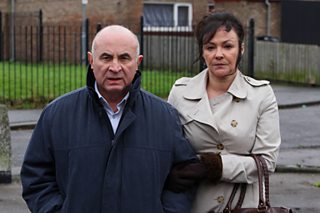The Βι¶ΉΤΌΕΔ's award-winning diversity
Amanda Rice
Head of Diversity, Βι¶ΉΤΌΕΔ

It's nice to know that when we do that well - when we seek to really understand and connect with difference through authentic portrayal and programmes - we also make programmes which a whole range of audiences love.
Just look at the past couple of weeks. The Βι¶ΉΤΌΕΔ has picked up awards related to our output which all serve to highlight the real progress we are making in being more reflective of our distinct audiences.
At the , 's (pictured above), which presents a complex and compelling insight into the lives of individuals from diverse backgrounds, won the Television Award, whilst the Radio Award went to The Hunchback of Notre Dame, the result of a collaboration between and , a disabled-led theatre company.
This follows last week's where a strand of our excellent series, Heavy Load, won the Excellence in Creative Output - Diverse Content award.
Our programmes took up 19 of the 32 nomination slots at the - a figure which demonstrates the breadth and depth of our programming and highlights the value of the Βι¶ΉΤΌΕΔ when it comes to educating and informing as well as stimulating debate on some tough issues that might otherwise be overlooked.
This included some for the Newsnight focus on mental health amongst MPs; 's documentary Cracking Up, part of the campaign; Radio 4's , and the radio drama Dos and Don'ts for the Mentally Interesting.
also received the Making a Difference award for the ongoing commitment to mental health issues.
This is one that we should be particularly proud of as it signals that one of our most popular and entertaining dramas is connecting with a whole range of audiences through great character-led storylines and a stream of fresh ideas. Critical to the success of programmes like EastEnders are good stories with well-rounded characters. A sensitive and nuanced portrayal of cultural difference and an avoidance of the stereotypes of old is key.
Get the stories right and believable characters will follow.
Portray difference authentically and viewers will follow.
Authenticity is something our viewers recognise as soon as they see it and it is that which makes them switch on. They expect to see it and so they should.
Stories about mental health can help to educate and inform our audiences. These stories can really get under the skin of issues which some viewers may never have had a connection with, whilst others may immediately recognise and identify with experiences that mirror aspects of their own life.
At the last night the Βι¶ΉΤΌΕΔ also won a number of awards in the area of disability portrayal. These were for Otto: Love, Lust and Las Vegas (Βι¶ΉΤΌΕΔ Three) and for EastEnders (Βι¶ΉΤΌΕΔ One), which over the last 12 months has consistently portrayed disability positively.
In some cases disability is merely incidental and in others it is central to the story line, but in all cases it reflects disabled life as it is - no mystique, no stereotypes, just people, who are far more than their impairment - getting on with their lives and facing the barriers society inevitably throws at them.
I believe the success at the RADAR awards can be credited to our renewed focus and effort over the last year to get to grips with portraying disability. The Βι¶ΉΤΌΕΔ's was launched in June this year and a number of talent searches have been held around the UK, where we've been meeting aspiring disabled actors and performers.
Are we there yet? Certainly not, but scooping big wins as we have over the last few days does indicate a real step-change, which can only bode well for the future.
